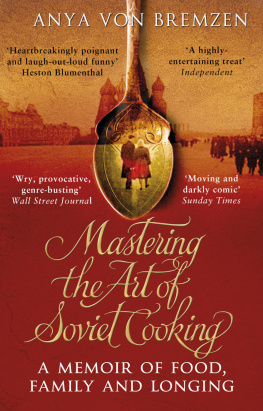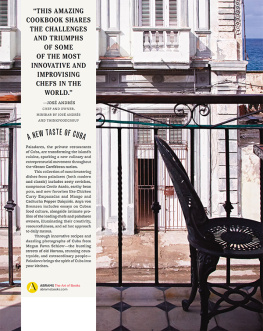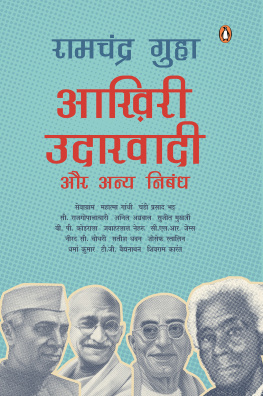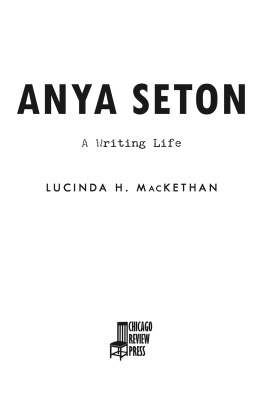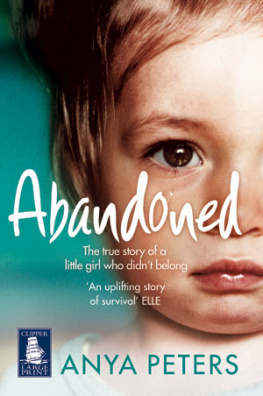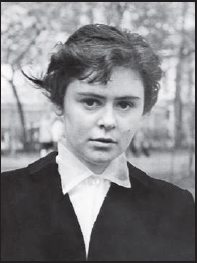ABOUT THE BOOK
Born in a surreal Moscow communal apartment where eighteen families shared one kitchen, Anya von Bremzen grew up singing odes to Lenin, black-marketeering Juicy Fruit gum at school and longing for a taste of the mythical West. It was a life by turns absurd, drab, naively joyous, melancholy and, finally, intolerable. In 1974, when Anya was ten, she and her mother fled to the USA, with no winter coats and no right of return. These days, Anya is the doyenne of high-end food writing. And yet, the flavour of Soviet kolbasa, like Prousts madeleine, transports her back to that vanished Atlantis known as the USSR.
In this sweeping tragicomic memoir, Anya recreates seven decades of the Soviet experience through cooking and food, and reconstructs a moving family history spanning three generations. Her narrative is embedded in a larger historical epic: Lenins bloody grain requisitioning, World War II starvation, Stalins table manners, Khrushchevs kitchen debates, Gorbachevs disastrous anti-alcohol policies and the ultimate collapse of the USSR. And all of this is bound together by Anyas sardonic wit, passionate nostalgia and piercing observations. Mastering the Art of Soviet Cooking is a book that stirs the soul as well as the senses.
CONTENTS
For Larisa
PROLOGUE
POISONED MADELEINES
WHENEVER MY MOTHER and I cook together, she tells me her dreams. So rich and intense is Moms dream life, shes given to cataloging and historicizing it: brooding black-and-white visions from her Stalinist childhood; sleek cold war thrillers laced with KGB spooks; melodramas starring duty-crushed lovers.
In a nod, I suppose, to her Iron Curtain past, Mother gets trapped in a lot of her dreamsalthough now, at seventy-nine years of age and after nearly four American decades, she tends to get trapped in pretty cool places. Deep, for example, in a mazelike, art-filled palace, one much resembling the Metropolitan Museum of Art, where, having retired as a schoolteacher, she works as a docent. In this dreams Technicolor finale, an orange balloon rescues Mom from her labyrinth and deposits her at the museums sumptuous caf. Whereupon she gorges on cream puffs.
But its one dream of hers from long ago, one I remember her telling me of many times, thats most emblematic. Here she is, skinny, short-haired, tiptoeing into my bedroom as I awake to the hopeless darkness of a Soviet socialist winter. Were in our minuscule flat in a shoddy Khrushchev-issue stained-concrete prefab on the outskirts of Moscow. Its 1968; I am five. Soviet tanks have just rolled into Prague, my dad has abandoned us recently, and weve moved here from a Kafka-esque communal apartment near the Kremlin where eighteen families shared one kitchen. Mom, in her robe with faded blue cornflowers, sits on my bed, presses a reassuring kiss to my forehead. But in her eyes I see such toska (that peculiarly Russian ache of the soul), such desperate longing, I know right away shes been visited once more by that dream.
Listen, listen, Anyuta, she murmurs. Yet again Im transformed into a lastochka (a swallow)... I escape from Russia, flying across the Soviet border, and somehow no one asks me for documents. And suddenly Im in Paris! In Paris! I circle over the ocher-colored streets, I recognize them from Utrillo paintings. On a tiny rueits called Street of a Cat Who FishesI notice an enchanting caf. I speed down to the impossibly colorful awning, Im dizzy from the delicious smell of the food, everything inside me is aching to taste it, to join the people inside
At this point my mother always woke up. Always on the wrong side of the entrance. Always ravenous, overwhelmed by yearning for a world beyond the border she was never destined to see. By nostalgia for flavors that would forever elude her.
All happy food memories are alike; all unhappy food memories are unhappy after their own fashion.
Mom and I both grew up within a triumphalist, scarlet-blazed fairy tale of socialist abundance and glorious harvests. Our experiences, though, featured no happy kitchens enveloped in an idyllic haze of vanilla, no kindly matriarchs setting golden holiday roasts on the table. Tea cakes rich in bourgeois butter? I do have such a memory... Its of Mom reading Proust aloud in our Khrushchevian slum; me utterly bored by the Frenchmans sensory reveries but besotted with the idea of the real, edible cookie. What did it taste like, that exotic capitalist madeleine? I desperately wanted to know.
Inevitably, a story about Soviet food is a chronicle of longing, of unrequited desire. So what happens when some of your most intense culinary memories involve foods you hadnt actually tasted? Memories of imaginings, of received histories; feverish collective yearning produced by seventy years of geopolitical isolation and scarcity
Until recently I didnt talk about such memories much. Asked why I write about food, Id just rattle off my well-rehearsed story. How my mother and I emigrated from Moscow without my father in 1974stateless refugees with no winter coats and no right of return. How, after I graduated from Juilliard, my piano career was cut short in the late eighties by a wrist injury. And how, searching for a new start, I fell into food, almost by accident, really. And I never looked back. Following my first cookbook, Please to the Table, about the cuisines of the former USSR, nice things kept happening: exciting magazine stories, more cookbooks, awards, almost two decades of travel and memorable meals.
Heres what I rarely mentioned: scribbled skull-and-bones warnings affixed to pots in my grandmothers communal apartment kitchen, where comrade residents pilfered one anothers soup meat. The afternoons of me desperately gagging on caviar at my kindergarten for the offspring of the Central Committeegagging because along with the elite Party fish eggs I felt I was ingesting the very ideology my anti-Soviet mom couldnt stomach. Nor did I mention the girls bathroom at School 110, where I, a nine-year-old fledgling black marketeer in a scratchy brown uniform, charged my Soviet classmates five kopeks to touch the bottle of Coca-Cola that friends had brought us from the mythical zagranitsa (abroad). Nor my present-day impulse to steal every last croissant from the splendid free breakfast buffets at the lovely hotels where I often stay for my work.
What would be the point of confessing my constant feeling of inhabiting two parallel food universes: one where degustation menus at places like Per Se or Noma are routine; the other where a simple bananaa once-a-year treat back in the USSRstill holds an almost talismanic sway over my psyche?
The stories Ive kept to myself are the stuff of this book. Ultimately, theyre why I really write about food. But they arent just my stories. For any ex-citizen of a three-hundred-million-strong Soviet superpower, food is never a mere individual matter. In 1917 bread riots sparked the overthrow of the czar, and, seventy-four years later, catastrophic food shortages helped push Gorbachevs floundering empire into the dustbin. In between, seven million people perished from hunger during Stalins collectivization; four million more starved to death during Hitlers war. Even in calmer times, under Khrushchev and Brezhnev, the daily drama of putting a meal on the table trumped most other concerns. Across eleven time zones the collective socialist fate of standing in food lines united comrades from the Unions fifteen ethnic republics. Food was an abiding theme of Soviet political history, permeating every nook and cranny of our collective unconscious. Food brought us together in obsessive Soviet hospitality rituals

